6 nov 2016
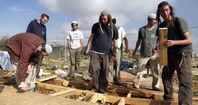
A new, unauthorized West Bank settlement outpost has been under construction in recent days near an Israeli military training camp in the northern Jordan Valley, five kilometers away from Ro’i settlement, Haaretz reported Sunday.
According to the same source, about two months ago, a group of Israelis built a hut in the Megamat Netzah area and then left.
But according to residents of the area and activists, the settlers reentered the territory on the night between Wednesday and Thursday of last week and leveled the ground before they embarked on construction works.
A spokeswoman for the Israeli Coordinator of Government Activities in the Territories confirmed that the construction was illegal and had been unauthorized by official authorities.
She claimed that the occupation authorities will intervene to stop the construction works and seize the equipment if needed.
According to Haaretz, this is the second unauthorized outpost built in the area in just one month and a half.
Staff from the U.S. consulate in Occupied Jerusalem who had been due to visit the area were told by the Israeli Civil Administration not to come, in part due to army exercises there, but members of Machsom Watch who visited the area told Haaretz that no military exercises were taking place.
According to the same source, about two months ago, a group of Israelis built a hut in the Megamat Netzah area and then left.
But according to residents of the area and activists, the settlers reentered the territory on the night between Wednesday and Thursday of last week and leveled the ground before they embarked on construction works.
A spokeswoman for the Israeli Coordinator of Government Activities in the Territories confirmed that the construction was illegal and had been unauthorized by official authorities.
She claimed that the occupation authorities will intervene to stop the construction works and seize the equipment if needed.
According to Haaretz, this is the second unauthorized outpost built in the area in just one month and a half.
Staff from the U.S. consulate in Occupied Jerusalem who had been due to visit the area were told by the Israeli Civil Administration not to come, in part due to army exercises there, but members of Machsom Watch who visited the area told Haaretz that no military exercises were taking place.
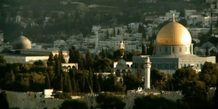
Israeli authorities reportedly banned the Muslim call to dawn prayer, from being projected over loudspeakers, in three different mosques in the Jerusalem district town of Abu Dis, on Friday, according to local sources.
Lawyer Bassam Bahr, head of a local committee in Abu Dis, said that Israeli forces raided the town just before the dawn prayer on Friday.
According to Bahr, Israeli forces raided the al-Rahman, al-Taybeh and al-Jamia mosques in the town, and informed the ‘muezzins’, the men responsible for the call to prayer — also known as the azan, which is broadcast five times a day from mosques — that the call for dawn prayer through the loudspeakers was banned.
Bahr added that the Israelis did not provide any reason for the ban, and also prevented locals living in the eastern part of the town from reaching the Salah al-Din mosque for dawn prayers.
Bahr condemned the “unjustified ban,” saying that “Israel attacks Palestinians in all aspects of their lives,” in the form of limiting free movement through the use of checkpoints, and through the disruption of daily life in the form of nightly detention raids.
The events in Abu Dis came a day after a number of Israeli settlers from illegal settlement of Pisgat Zeev protested in front of the house of Israeli Mayor of Jerusalem Nir Barakat over the ‘noise pollution’ caused by the Muslim call to prayer.
A spokesperson for the Jerusalem municipality told Ma’an News Agency that Barkat, “in collaboration with the Jerusalem District police chief and local Muslim leadership, has developed a plan to protect the religious freedom of Muslim muezzin to announce the call to prayer, while ensuring reasonable quiet in Jerusalem’s residential areas.”
The spokesperson went on to add that the municipality guidelines would include “increased instructions for muezzin operators regarding technical guidelines for optimal playback and sound amplification, increased mapping of city mosques, and continuous dialogue with local Muslim leadership.”
Adnan al-Husseini, the Palestinian Authority (PA)-appointed governor of Jerusalem, said, at the time, that the call to prayer was one of the main Muslim religious rituals and an integral part of Jerusalem’s identity. He said that Israeli demands to lower the sound of the azan was a threat which had been issued several times before in Jerusalem.
Al-Husseini said that the sound of the azan doesn’t rise above an agreed-upon decibel level, adding that Israeli settlers were not annoyed by the noise, but by the call to prayer as a reminder of Palestinian presence in Jerusalem.
Meanwhile, Hatem Abd Al-Qader, a Fateh official in Charge of Jerusalem affairs, said that Israel aimed to provoke Muslims by attempting to ban the call to prayer.
Abd al-Qader said that the Israeli settlers’ protest against the azan came amid constant violations and raids of the Al-Aqsa Mosque compound in East Jerusalem’s Old City, and demolition of Muslim graves in Jerusalem, which he said were part of a broader Israeli plan to destroy the Palestinian Muslim and Christian identities of Jerusalem and replace them with a Jewish one, turning the Israeli-Palestinian political conflict into a religious one.
Palestinian communities in annexed East Jerusalem — within the municipal boundaries and also beyond the wall in the occupied West Bank — and the larger Jerusalem district, have long been targeted by Israeli authorities in what has been denounced as a policy of “Judaization” of the holy city at the expense of other religious communities.
This “Judaization” has been characterized by the continuous expansion of illegal Jewish-only settlements and a large-scale policy of demolition of Palestinian homes.
The Al-Aqsa Mosque Compound has also been the stage of numerous tensions over the years, with Israeli forces imposing tight restrictions on Palestinian worshipers at the site.
Many Palestinians fear that right-wing Israelis are attempting to reclaim the holy site, as it sits where Jews believe the First and Second Temples once stood.
Lawyer Bassam Bahr, head of a local committee in Abu Dis, said that Israeli forces raided the town just before the dawn prayer on Friday.
According to Bahr, Israeli forces raided the al-Rahman, al-Taybeh and al-Jamia mosques in the town, and informed the ‘muezzins’, the men responsible for the call to prayer — also known as the azan, which is broadcast five times a day from mosques — that the call for dawn prayer through the loudspeakers was banned.
Bahr added that the Israelis did not provide any reason for the ban, and also prevented locals living in the eastern part of the town from reaching the Salah al-Din mosque for dawn prayers.
Bahr condemned the “unjustified ban,” saying that “Israel attacks Palestinians in all aspects of their lives,” in the form of limiting free movement through the use of checkpoints, and through the disruption of daily life in the form of nightly detention raids.
The events in Abu Dis came a day after a number of Israeli settlers from illegal settlement of Pisgat Zeev protested in front of the house of Israeli Mayor of Jerusalem Nir Barakat over the ‘noise pollution’ caused by the Muslim call to prayer.
A spokesperson for the Jerusalem municipality told Ma’an News Agency that Barkat, “in collaboration with the Jerusalem District police chief and local Muslim leadership, has developed a plan to protect the religious freedom of Muslim muezzin to announce the call to prayer, while ensuring reasonable quiet in Jerusalem’s residential areas.”
The spokesperson went on to add that the municipality guidelines would include “increased instructions for muezzin operators regarding technical guidelines for optimal playback and sound amplification, increased mapping of city mosques, and continuous dialogue with local Muslim leadership.”
Adnan al-Husseini, the Palestinian Authority (PA)-appointed governor of Jerusalem, said, at the time, that the call to prayer was one of the main Muslim religious rituals and an integral part of Jerusalem’s identity. He said that Israeli demands to lower the sound of the azan was a threat which had been issued several times before in Jerusalem.
Al-Husseini said that the sound of the azan doesn’t rise above an agreed-upon decibel level, adding that Israeli settlers were not annoyed by the noise, but by the call to prayer as a reminder of Palestinian presence in Jerusalem.
Meanwhile, Hatem Abd Al-Qader, a Fateh official in Charge of Jerusalem affairs, said that Israel aimed to provoke Muslims by attempting to ban the call to prayer.
Abd al-Qader said that the Israeli settlers’ protest against the azan came amid constant violations and raids of the Al-Aqsa Mosque compound in East Jerusalem’s Old City, and demolition of Muslim graves in Jerusalem, which he said were part of a broader Israeli plan to destroy the Palestinian Muslim and Christian identities of Jerusalem and replace them with a Jewish one, turning the Israeli-Palestinian political conflict into a religious one.
Palestinian communities in annexed East Jerusalem — within the municipal boundaries and also beyond the wall in the occupied West Bank — and the larger Jerusalem district, have long been targeted by Israeli authorities in what has been denounced as a policy of “Judaization” of the holy city at the expense of other religious communities.
This “Judaization” has been characterized by the continuous expansion of illegal Jewish-only settlements and a large-scale policy of demolition of Palestinian homes.
The Al-Aqsa Mosque Compound has also been the stage of numerous tensions over the years, with Israeli forces imposing tight restrictions on Palestinian worshipers at the site.
Many Palestinians fear that right-wing Israelis are attempting to reclaim the holy site, as it sits where Jews believe the First and Second Temples once stood.
5 nov 2016
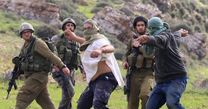
At least three Palestinians were injured Saturday afternoon after being brutally attacked by a group of Israeli settlers south of Ramallah.
The Palestinian Red Crescent Society affirmed that a group of settlers from Talmon illegal settlement attacked Palestinian farmers while picking olive trees in their agricultural land in Jania town south of the city.
Three people suffered different injuries during the attack, the sources added.
One of the injured farmers was transferred to Ramallah governmental hospital in critical condition, local sources underlined.
The Palestinian Red Crescent Society affirmed that a group of settlers from Talmon illegal settlement attacked Palestinian farmers while picking olive trees in their agricultural land in Jania town south of the city.
Three people suffered different injuries during the attack, the sources added.
One of the injured farmers was transferred to Ramallah governmental hospital in critical condition, local sources underlined.
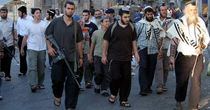
A horde of Jewish settlers on Saturday afternoon bullied a store owner and a Palestinian family near the Ibrahimi Mosque in al-Khalil city.
Eyewitnesses told the Palestinian Information Center (PIC) that several settlers stormed a commercial store near the Ibrahimi Mosque and assaulted its owner as well as a family during its presence on the same street.
They added that the settlers told the owner that they were the people responsible for sabotaging his store eight months ago.
Eyewitnesses told the Palestinian Information Center (PIC) that several settlers stormed a commercial store near the Ibrahimi Mosque and assaulted its owner as well as a family during its presence on the same street.
They added that the settlers told the owner that they were the people responsible for sabotaging his store eight months ago.
3 nov 2016
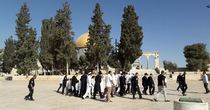
The Israeli so-called Temple Mount organizations declared intention to hold a conference in the Knesset next Monday calling for the increase of settlers’ break-ins into al-Aqsa Mosque, Masra Media Center revealed Thursday.
Hundreds of religious leaders and MKs are expected to participate in the conference which was suggested by the MK Yehuda Glick, according to the center.
The conference would also celebrate the record number of Jewish settlers breaking into Al-Aqsa Mosque in 2016 so far.
According to Israeli sources, 14,094 Israeli settlers stormed al-Aqsa from September 2015 to October 2016. 3,000 of them broke into the compound in October 2016.
Hundreds of religious leaders and MKs are expected to participate in the conference which was suggested by the MK Yehuda Glick, according to the center.
The conference would also celebrate the record number of Jewish settlers breaking into Al-Aqsa Mosque in 2016 so far.
According to Israeli sources, 14,094 Israeli settlers stormed al-Aqsa from September 2015 to October 2016. 3,000 of them broke into the compound in October 2016.
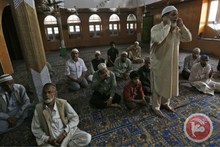
The Israeli municipality declared intention to ban Adhan (Islamic call to prayer) in occupied Jerusalem, Israeli media sources revealed.
Israeli mayor Nir Barkat has called for Israeli police's collaboration to stop the ‘noise pollution’ caused by the Muslim call to prayer in the occupied city of Jerusalem.
“The Jerusalem municipality would collaborate with Israeli police to enforce noise regulations regarding the call to prayer,” he said.
The Israeli decision came as part of the municipality’s attempts to impose control over the city and to wipe out its Islamic and Arab identity.
Commenting on the Israeli decision, head of the Islamic Supreme Council Sheikh Ekrema Sabri said that the call to prayer was not just a Muslim religious ritual, but an act of worship, and that attempting to ban the Adhan would constitute a violation of freedom of worship.
Sabri added that the real noise pollution was the sound of Israeli military jets hovering in Jerusalem’s sky, the sound of Israeli military tanks raiding Palestinian cities and villages, and the noise of bombs fired at Palestinian citizens.
Israeli settlers call to stop 'noise pollution' caused by Muslim call to prayer in Jerusalem
A number of Israeli settlers from illegal settlement of Pisgat Zeev protested in front of the house of Israeli Mayor of Jerusalem Nir Barakat on Thursday morning over the ‘noise pollution’ caused by the Muslim call to prayer.
According to Israeli radio station Reshet Bet, Barkat responded to the settlers’ complaints by saying that the Jerusalem municipality would collaborate with Israeli police to enforce noise regulations regarding the call to prayer.
The call to prayer -- also known as the adhan -- is broadcast five times a day from mosques or Islamic centers.
A spokesperson for the Jerusalem municipality told Ma’an that Barkat, "in collaboration with the Jerusalem District police chief and local Muslim leadership, has developed a plan to protect the religious freedom of Muslim muezzin to announce the call to prayer, while ensuring reasonable quiet in Jerusalem's residential areas.”
The spokesperson went on to add that the municipality guidelines would include “increased instructions for muezzin operators regarding technical guidelines for optimal playback and sound amplification, increased mapping of city mosques, and continuous dialogue with local Muslim leadership."
Adnan al-Husseini, the Palestinian Authority (PA)-appointed governor of Jerusalem, told Ma’an that the call to prayer was one of the main Muslim religious rituals and an integral part of Jerusalem’s identity. He said that Israeli demands to lower the sound of the adhan was a threat which had been issued several times before in Jerusalem.
Al-Husseini said that the sound of the adhan doesn’t rise above an agreed-upon decibel level, adding that Israeli settlers were not annoyed by the noise, but by the call to prayer as a reminder of Palestinian presence in Jerusalem.
Former Grand Mufti of Jerusalem Sheikh Ekrima Sabri said that the call to prayer was not just a Muslim religious ritual, but an act of worship, and that attempting to ban the adhan would represent a violation of freedom of worship.
Sabri added that the real noise pollution was the sound of of Israeli military jets hovering in Jerusalem’s sky, the sound of Israeli military tanks raiding Palestinian cities and villages, and the noise of bombs fired at Palestinian citizens.
Meanwhile, Hatem Abd Al-Qader, a Fatah official in Charge of Jerusalem affairs, told Ma’an that Israel aimed to provoke Muslims by attempting to ban the call to prayer -- although no reports indicated on Thursday that the Jerusalem municipality was attempting to ban the adhan outright.
Abd al-Qader said that the Israeli settlers’ protest against the adhan came amid constant violations and raids of the Al-Aqsa Mosque compound in East Jerusalem’s Old City, and demolition of Muslim graves in Jerusalem, which he said were part of a broader Israeli plan to destroy the Palestinian Muslim and Christian identities of Jerusalem and replace them with a Jewish one, turning the Israeli-Palestinian political conflict into a religious one.
Palestinian communities in occupied East Jerusalem -- within the municipal boundaries and also beyond the wall in the occupied West Bank -- have long been targeted by Israeli authorities in what has been denounced as a policy of "Judaization" of the holy city at the expense of other religious communities.
This “Judaization” has been characterized by the continuous expansion of illegal Jewish-only settlements and a large-scale policy of demolition of Palestinian homes.
The Al-Aqsa Mosque Compound has also been the stage of numerous tensions over the years, with Israeli forces imposing tight restrictions on Palestinian worshipers at the site.
Many Palestinians fear that right-wing Israelis are attempting to reclaim the holy site, as it sits where Jews believe the First and Second Temples once stood.
Israeli mayor Nir Barkat has called for Israeli police's collaboration to stop the ‘noise pollution’ caused by the Muslim call to prayer in the occupied city of Jerusalem.
“The Jerusalem municipality would collaborate with Israeli police to enforce noise regulations regarding the call to prayer,” he said.
The Israeli decision came as part of the municipality’s attempts to impose control over the city and to wipe out its Islamic and Arab identity.
Commenting on the Israeli decision, head of the Islamic Supreme Council Sheikh Ekrema Sabri said that the call to prayer was not just a Muslim religious ritual, but an act of worship, and that attempting to ban the Adhan would constitute a violation of freedom of worship.
Sabri added that the real noise pollution was the sound of Israeli military jets hovering in Jerusalem’s sky, the sound of Israeli military tanks raiding Palestinian cities and villages, and the noise of bombs fired at Palestinian citizens.
Israeli settlers call to stop 'noise pollution' caused by Muslim call to prayer in Jerusalem
A number of Israeli settlers from illegal settlement of Pisgat Zeev protested in front of the house of Israeli Mayor of Jerusalem Nir Barakat on Thursday morning over the ‘noise pollution’ caused by the Muslim call to prayer.
According to Israeli radio station Reshet Bet, Barkat responded to the settlers’ complaints by saying that the Jerusalem municipality would collaborate with Israeli police to enforce noise regulations regarding the call to prayer.
The call to prayer -- also known as the adhan -- is broadcast five times a day from mosques or Islamic centers.
A spokesperson for the Jerusalem municipality told Ma’an that Barkat, "in collaboration with the Jerusalem District police chief and local Muslim leadership, has developed a plan to protect the religious freedom of Muslim muezzin to announce the call to prayer, while ensuring reasonable quiet in Jerusalem's residential areas.”
The spokesperson went on to add that the municipality guidelines would include “increased instructions for muezzin operators regarding technical guidelines for optimal playback and sound amplification, increased mapping of city mosques, and continuous dialogue with local Muslim leadership."
Adnan al-Husseini, the Palestinian Authority (PA)-appointed governor of Jerusalem, told Ma’an that the call to prayer was one of the main Muslim religious rituals and an integral part of Jerusalem’s identity. He said that Israeli demands to lower the sound of the adhan was a threat which had been issued several times before in Jerusalem.
Al-Husseini said that the sound of the adhan doesn’t rise above an agreed-upon decibel level, adding that Israeli settlers were not annoyed by the noise, but by the call to prayer as a reminder of Palestinian presence in Jerusalem.
Former Grand Mufti of Jerusalem Sheikh Ekrima Sabri said that the call to prayer was not just a Muslim religious ritual, but an act of worship, and that attempting to ban the adhan would represent a violation of freedom of worship.
Sabri added that the real noise pollution was the sound of of Israeli military jets hovering in Jerusalem’s sky, the sound of Israeli military tanks raiding Palestinian cities and villages, and the noise of bombs fired at Palestinian citizens.
Meanwhile, Hatem Abd Al-Qader, a Fatah official in Charge of Jerusalem affairs, told Ma’an that Israel aimed to provoke Muslims by attempting to ban the call to prayer -- although no reports indicated on Thursday that the Jerusalem municipality was attempting to ban the adhan outright.
Abd al-Qader said that the Israeli settlers’ protest against the adhan came amid constant violations and raids of the Al-Aqsa Mosque compound in East Jerusalem’s Old City, and demolition of Muslim graves in Jerusalem, which he said were part of a broader Israeli plan to destroy the Palestinian Muslim and Christian identities of Jerusalem and replace them with a Jewish one, turning the Israeli-Palestinian political conflict into a religious one.
Palestinian communities in occupied East Jerusalem -- within the municipal boundaries and also beyond the wall in the occupied West Bank -- have long been targeted by Israeli authorities in what has been denounced as a policy of "Judaization" of the holy city at the expense of other religious communities.
This “Judaization” has been characterized by the continuous expansion of illegal Jewish-only settlements and a large-scale policy of demolition of Palestinian homes.
The Al-Aqsa Mosque Compound has also been the stage of numerous tensions over the years, with Israeli forces imposing tight restrictions on Palestinian worshipers at the site.
Many Palestinians fear that right-wing Israelis are attempting to reclaim the holy site, as it sits where Jews believe the First and Second Temples once stood.
1 nov 2016

The High Presidential Commission for Church Affairs in Palestine strongly condemned Tuesday the raising of Israeli flag over the eastern entrance to the Holy Sepulchre Church.
The commission considered the act as a flagrant violation that came as part of Israel’s daily breaches to the Palestinian sovereignty in occupied Jerusalem
Raising the Israeli flag on Holy Sepulchre Church is a flagrant violation to the 2012 resolution which recognized Palestine as a non-member observer state in the United Nations, the commission said.
The commission stressed the importance of maintaining the Status Quo Law in occupied Jerusalem which preserves freedom of worship for all religions, and prevents the raising of any flag over holy places.
It also called for standing firmly against any Israeli attempt to impose control over the Palestinian holy places.
Earlier on Monday, Israeli extremist groups raised the Israeli flag over the Holy Sepulchre Church.
The commission considered the act as a flagrant violation that came as part of Israel’s daily breaches to the Palestinian sovereignty in occupied Jerusalem
Raising the Israeli flag on Holy Sepulchre Church is a flagrant violation to the 2012 resolution which recognized Palestine as a non-member observer state in the United Nations, the commission said.
The commission stressed the importance of maintaining the Status Quo Law in occupied Jerusalem which preserves freedom of worship for all religions, and prevents the raising of any flag over holy places.
It also called for standing firmly against any Israeli attempt to impose control over the Palestinian holy places.
Earlier on Monday, Israeli extremist groups raised the Israeli flag over the Holy Sepulchre Church.
